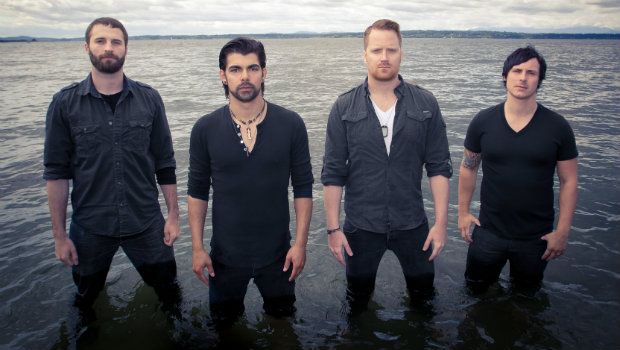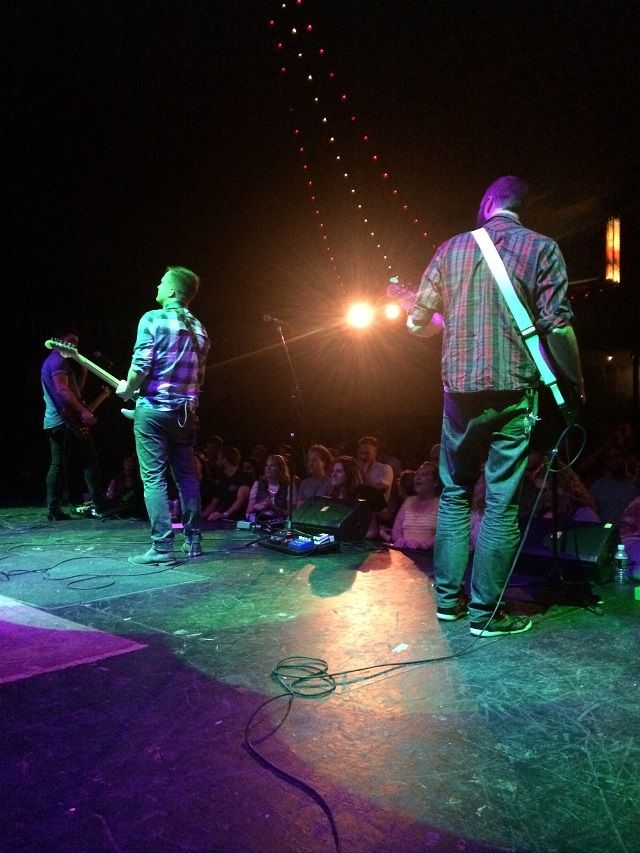The Classic Crime – 1st ROAD BLOG from their Spring Tour 2015
The rock band, The Classic Crime, is currently on their 2015 spring tour, hitting cities across the western half of the United States, with supporting act, Megosh. While they’re on this tour, they will be doing an exclusive blog for…

The rock band, The Classic Crime, is currently on their 2015 spring tour, hitting cities across the western half of the United States, with supporting act, Megosh. While they’re on this tour, they will be doing an exclusive blog for our site. You can check out the first entry, with photos, after the break.
When I was asked to write a tour blog for Digital Tour Bus, my first thought was to write about stories from the road, how the shows are going, struggles with my voice, interactions with fans, etc. But I think I want to take a different route. I think I want to talk about the business of touring.
As a local band from 2003-2005, The Classic Crime rarely got paid to play a show. We were green, excited at the opportunity to share our music with anyone who would listen, so despite having a hundred friends paying to see us, we rarely, if ever, got paid money (we got paid in beer a lot). We signed to Tooth & Nail records in the summer of 2005, and hit the road on our first national tour in January of 2006.
As a new band on a big tour, we received $100 a night, which wasn’t even enough to cover the gas between venues, but we were thrilled. We got to play in front of thousands of popular bands’ fans, which in retrospect was an invaluable gift. As our own popularity grew, we were able to headline shows for a guarantee of $500 a night on tour, with the potential of a back-end percentage if the show earned more than the expenses. With the $500 and merch profits we were able to pay for gas, band per diems for food, a crew member, and the occasional hotel room (normally we’d sleep in Wal-Mart parking lots). We rarely made back end, and we rarely paid ourselves after the tour was over… there was just no money left. The guarantees were just enough to get by.
We became aware that one of the reasons (besides the fact that we weren’t straight blowing up, like we naively expected) was that show expenses were too high, and built on a model that was established way back in our parents day when profits were blowing around like a cash grab money machine. As the touring industry shrunk, it seemed the house nut was the last thing to take a hit. The promoters and venues were protecting their own profits, and rightly so, but at the expense of the artist.
Traditional show contracts are set up with advertising budgets, promoter profit, and a premium for security, room rental, lights and sound that went well beyond what the promoter actually paid to the club. Basically, promoters will build their own profits into the show contract, in the form of these other line items. As the last to get paid on the totem pole, the band gets the leftovers (after booking agent and management take their 30% of gross). We wondered if there was another way, like if we could actually tour at our level AND come home with some money, but the opportunity never presented itself. Eventually, touring became an expense that wasn’t worth the effort and time away from our families.
In 2011, we left T&N, on good terms, but we were looking for a new way to do business. With no labels knocking at our door, we were left with a lot of uncertainty about our future as an independent band. Questions arose: How can we come up with the money to make a new record that is on par with our previous (bigger budget) albums? How do we release it? Is it worth it to continue? Do people care? Are we done?

In late 2011, with much trepidation, we launched a Kickstarter campaign to raise the budget for a new record. People responded, and to our absolute shock we reached our goal in 24 hours. The campaign ended up raising 286% of what we’d asked for… so I did what any burn-out musician would, I quit the class I was taking to be a certified real estate agent and focused, once again, on music… My task became making our album “Phoenix” the best album I could with the budget we’d received.
A quick aside, if you think your value depends on what entities want to do business with you, it’s time to ask your customers. We thought since the labels didn’t care, nobody did. But we were dead wrong.
Our release, “Phoenix”, in 2012 was a huge success (if you count our Kickstarter campaign if was our best first-week showing ever). The release was completely DIY in every sense. We did it all from marketing, distribution, radio, publicity… trying desperately to cover all our bases. We didn’t want the record to be treated any less than our previous records on T&N. I learned everything I needed to know about releasing a record; what works, what doesn’t, and how to do it well. We essentially became our own record label, and we discovered the tools that were available to us in this new music landscape. For the first time ever, we actually made money on the sale of our music. This is not to say we could have done it without Tooth & Nail’s investment in helping us build the demand for our music, it’s just to say that the model of “front-the-money-and-recoup-from-sales” is not always the preferable option in this landscape.
But still, touring was a hard one to fix. Promoters and booking agents had built in profits, and we never seemed to make enough to make it worthwhile.
When we decided to book the tour we’re currently on, we had two choices. We could hire a booking agent at 10% of whatever guarantee he could get, from whatever promoter would pay it, or we could try something new.
Inspired by a DIY spirit (and the shot in the arm from our crowd-funded records), we partnered with an independent ticketing/promoter/booking company that we’d had some success doing regional shows with. Their ticketing fees are low (no more Ticketmaster taxing our sales), and they’re interested in creating a new viable option for touring bands. We were happy to be the guinea pigs. After all, anyone trying to approach the music industry from a non-traditional perspective is a friend to us.
Instead of booking through promoters, we went directly to venues in different cities and rented the rooms at their best rate. Instead of hospitality budget, we buy our own food and drinks. Instead of advertising budget, we promote the tour on our social media. We get the room at a flat rate, staff and security included. We spend money to boost Facebook posts or advertisements where we see fit. No promoter profit, no booking agent fees, none of the traditional “padding” that comes from the old model. Afton, our ticketing company, vets and books locals who commit to promoting the show and selling tickets for a percentage of the ticket price, which does two things: word of mouth advertising for the show (the best kind), and actually paying the local band (which if you remember, never happened for us). Afton does their work for a flat fee, the right to sell the tickets exclusively, and a small percentage of the back end. We’ve reduced the house nut, and surprisingly hit our back end on every show we’ve played so far (which is only five as I’m writing this, but it feels like it’s working!)
We’ve always known that most promoters don’t promote, they just go between the venue and the booking agent, hang some posters in the venue, post online, and build their profit into the contracts. We’ve always known that it was our social media that sold tickets, not the promoter. I can’t say that’s true for every level, but at ours, it’s been true.
Using the old model model, we had three people between the band and the venue (management, promoter, booking agent), and as the money came in, each of those hands took a cut before it got back to the band. By eliminating them (especially the promoter, since we know shows are promoted best by the band themselves on social media), we are actually able to turn a profit. Touring is actually worth us taking time away from our jobs and our family.
Of course, this means more work for us. We’re constantly going back and forth with our ticketing company. We’re weighing pro’s and con’s of different rooms and different markets. We’re doing the work of booking, promoting, and managing the tour together, but that’s the point of DIY. When you do something yourself, it’s more work, but it’s also more rewarding. It gets us out of bed in the morning.
For the first time in a long time, we’re excited at the prospect of touring again. Not only because we can make actual money, or because playing music live is really fun, but because it’s risky and new and rewarding to try to change the approach we’ve always taken to touring… and honestly, it’s just fun to stick it to the man.

![Between the Buried and Me Makes the Perfect Tour Bus Latte - COOKING AT 65MPH Ep. 49 [VIDEO]](/content/images/size/w1000/2024/07/Between-The-Buried-And-Me---Cooking-at-65mph---ICON.webp)
![The Ghost Inside - BUS INVADERS Ep. 1926 [VIDEO]](/content/images/size/w1000/2024/07/The-Ghost-Inside---Bus-Invaders---ICON.webp)
![Between the Buried and Me - BUS INVADERS Ep. 1917 [VIDEO]](/content/images/size/w1000/2024/05/Between-The-Buried-and-Me---Bus-Invaders---ICON.webp)
![Mom Jeans - BUS INVADERS Ep. 1914 [VIDEO]](/content/images/size/w1000/2024/05/Mom-Jeans---Bus-Invaders---ICON.webp)
![The Acacia Strain's Devin Shidaker - GEAR MASTERS Ep. 494 [VIDEO]](/content/images/size/w1000/2024/04/The-Acacia-Strain---Devin-Shidaker---Gear-Masters---ICON.webp)
![Twin Temple - BUS INVADERS Ep. 1902 [VIDEO]](/content/images/size/w1000/2024/04/Twin-Temple---Bus-Invaders---ICON-min.jpg)
![The Prize Fighter Inferno's Claudio Sanchez - GEAR MASTERS Ep. 491 [VIDEO]](/content/images/size/w1000/2024/04/The-Prize-Fighter-Inferno---Gear-Masters---ICON-min.jpg)
![Nonpoint - BUS INVADERS Ep. 1878 [VIDEO]](/content/images/size/w1000/2024/02/Nonpoint---Bus-Invaders---ICON.jpg)
![TesseracT - BUS INVADERS Ep. 1870 [VIDEO]](/content/images/size/w1000/2024/02/TesseracT---Bus-Invaders---ICON-min.jpg)
![Armor For Sleep - BUS INVADERS Ep. 1868 [VIDEO]](/content/images/size/w1000/2024/02/Armor-For-Sleep---Bus-Invaders---ICON-min.jpg)
![ZZ Ward - BUS INVADERS Ep. 1846 [VIDEO]](/content/images/size/w1000/2023/12/ZZ-Ward---Bus-Invaders---ICON.jpg)
![The Aces - BUS INVADERS Ep. 1838 [VIDEO]](/content/images/size/w1000/2023/12/The-Aces---Bus-Invaders---ICON-min.jpg)